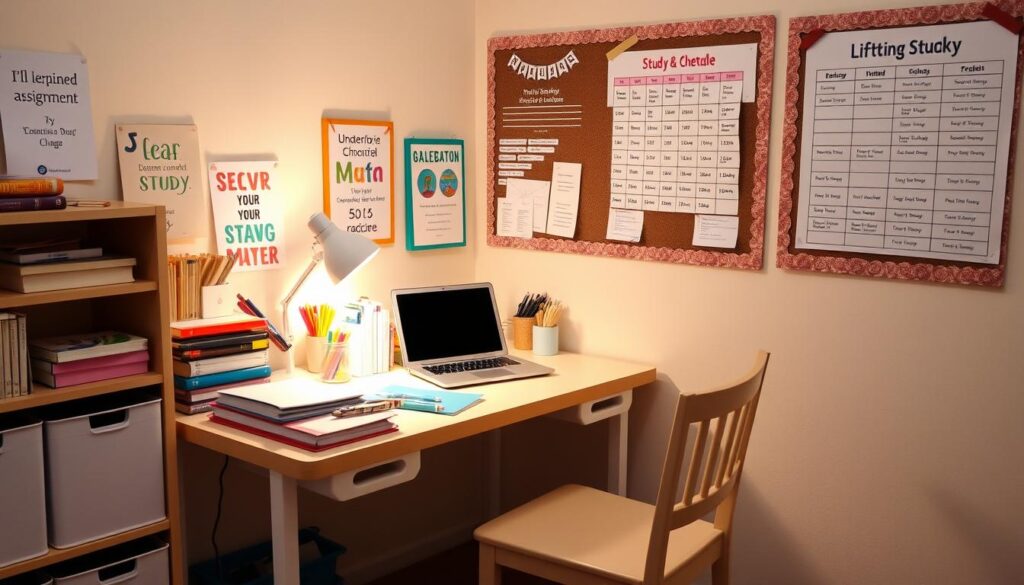Are You Struggling to Manage Your Child’s Homework? Wondering how to make homework time less stressful and more productive? You’re not alone. Many parents find managing their kids’ homework challenging, but with the right strategies, you can help your child succeed academically and develop strong study skills.
This guide has practical tips to make homework time better. It helps reduce stress and boosts school success for kids.

Key Takeaways
- Make a special study area without distractions to help kids focus.
- Set a regular after-school routine that includes homework, fun activities, and breaks.
- Teach kids to manage their time well to help them learn to plan.
- Help them learn to do homework on their own to build confidence.
- Use online tools to make homework easier to organize and talk to teachers.
Creating an Effective Homework Environment for Success
It’s key to have a special place for homework that’s free from distractions. By setting up a homework workspace for kids that’s welcoming and tidy, parents can cut down on homework distractions. This helps create a kid-friendly study environment.
Designating a Dedicated Study Space
Find a quiet, bright spot in your home for homework and studying. It could be a corner in your child’s room, a cozy spot in the living room, or a desk in a shared area. Make sure it’s clean and free from things that might distract, like TVs or busy areas.
Managing Environmental Distractions
- Keep digital devices, like phones and tablets, away during homework.
- Turn off TVs and radios and ask family to keep it quiet.
- Give your child a comfy, ergonomic chair and desk to help them stay focused.
Essential Supplies and Organization Tools
Make sure the homework area has all the needed supplies, like pens, pencils, and paper. Help your child keep things organized with folders, binders, and storage. This makes it easier for them to stay on track and focused.
| Recommended Supplies | Organizational Tools |
|---|---|
| Pens and pencils Notebook or loose-leaf paper Highlighters Ruler Scissors Glue stick | Folder or binder for each subject Desk organizer with compartments Bulletin board or whiteboard Wall calendar or planner Shelves or storage bins |
By setting up a dedicated and well-stocked homework area, parents can help their kids stay focused and motivated. This makes learning easier and more effective.
School-Age Homework Management Strategies: Core Principles
Effective homework management for school-age children is based on key strategies. These strategies include time management, organizational skills, and motivation methods. They are designed to meet the needs of young learners.
At the heart of successful homework time management for children is establishing consistent routines and staying focused. Teaching kids study organization skills helps them tackle assignments methodically. This reduces stress and boosts productivity. Also, using homework motivation techniques for children can spark a love for learning and a sense of achievement.
- Develop structured schedules and minimize distractions to optimize homework time
- Encourage organizational habits, such as designated study spaces and consistent supply storage
- Employ positive reinforcement and celebrate small victories to foster intrinsic motivation
By using these core principles, parents can help their school-age children succeed academically. They also foster a lifelong love of learning.

“The key to effective homework management is finding the right balance between structure and flexibility, empowering children to take ownership of their studies while providing the necessary guidance and support.”
Establishing a Consistent After-School Routine
Creating a good homework routine is key for elementary students to do well in school. A consistent after-school plan helps kids learn to manage their time. It also makes sure homework gets done without stress.
Planning Around Extracurricular Activities
When making an after-school routine, think about your child’s outside activities. Plan homework time around these to keep things balanced and easy to handle.
Setting Realistic Time Blocks
Set aside specific times for homework and study. Think about how long your child can focus and stay energetic. A good routine has focused work times and short breaks to keep things fresh.
Incorporating Break Periods
- Make sure your child takes learning breaks during homework. These can be active play, healthy snacks, or calm moments.
- Breaks help avoid burnout, keep focus sharp, and keep your child interested in their homework.
With a solid after-school routine that includes activities, realistic time slots, and breaks, your elementary student can thrive. This routine supports their academic success and happiness.
Time Management Techniques for Different Age Groups
Every child is different, and homework strategies should match their unique needs. By knowing the developmental stages of kids, parents can help with time management, use timers, and plan homework effectively. This approach leads to success.
Young elementary school students benefit from visual timers. These colorful tools help them understand time. They stay focused and on task. Using timers with breaks helps them develop good study habits early on.
As kids get older, checklists and schedules become more useful. They help kids break down big tasks and prioritize. This builds important organizational skills for the future.
Middle schoolers need more independence. Use timers to teach them to manage their time. Help them set goals and use time-blocking. This prepares them for high school and college.
“Effective time management is not about working harder, but working smarter. By tailoring strategies to each child’s needs, parents can unlock their full help with time management and use timers to help them succeed.”
It’s important to find the right balance between helping and letting kids do it themselves. Teaching them to own their homework helps them develop time management skills for life.

Supporting Independence While Providing Guidance
As parents, finding the right balance is key. It’s important to support your child’s homework without doing it for them. By using the right methods, teaching self-monitoring, and boosting confidence, you help your child succeed on their own.
Age-Appropriate Assistance Methods
The support you give should grow with your child. Younger students need hands-on help and clear steps. As they get older, step back and let them solve problems and organize their work. This helps them become independent and learn important skills.
Teaching Self-Monitoring Skills
Help your child take charge of their homework. Teach them to track their progress, find tough spots, and solve problems. This builds independence, self-awareness, and problem-solving skills, all valuable for life.
Building Homework Confidence
Positive words and encouragement are powerful. Celebrate their wins, big or small, and offer helpful feedback. This boosts their confidence and sets them up for success in school and beyond.
It’s all about giving the right amount of homework help without doing the work. By finding the balance, you empower your child to handle their homework on their own.
Digital Tools and Resources for Homework Organization
In today’s digital world, many tools and resources help with homework organization. These digital homework management tools, homework organization apps for kids, and homework tracking for parents make it easier. They improve productivity and study habits.
Homework Planning and Tracking Apps
Apps like Todoist, Google Tasks, and Microsoft To-Do are great for homework. They let students make to-do lists, set reminders, and track their work. This helps them manage their homework better.
Digital Calendars and Scheduling Tools
Digital calendars, like Google Calendar or Apple Calendar, are very helpful. They let users plan study time and block out other activities. They also send reminders about deadlines.
Note-Taking and File Management Apps
Evernote, Microsoft OneNote, and Google Keep are perfect for notes and files. They keep all homework materials in one place. This makes it easier to find what you need.
| Digital Tool | Key Features | Compatibility |
|---|---|---|
| Todoist | Task management, project planning, collaboration | Web, mobile (iOS, Android), desktop |
| Google Calendar | Scheduling, task management, reminders | Web, mobile (iOS, Android) |
| Evernote | Note-taking, file storage, web clipping | Web, mobile (iOS, Android), desktop |
Using these digital homework management tools, homework organization apps for kids, and homework tracking for parents helps a lot. They make homework easier, improve time management, and create a better study space.
Parent-Teacher Communication Strategies
Good communication between parents and teachers is key for a child’s success in school. By knowing the teachers and communicating with them often, parents can help with homework and solve problems.
Understanding Assignment Expectations
Parents need to understand the assignment expectations from teachers. They should know the due dates, instructions, and any special rules. Talking openly with teachers helps parents guide their kids better.
Addressing Homework Challenges
If homework challenges come up, communication with teachers is vital. Parents should talk to teachers about any problems their child faces. This way, parents and teachers can work together to solve these issues.
Progress Monitoring Methods
- Regular check-ins with teachers to discuss a child’s academic progress
- Review of graded assignments and test scores to identify areas for improvement
- Participation in parent-teacher conferences to address any concerns or celebrate successes
By having open and regular parent-teacher homework collaboration, families and teachers can make sure learning is positive and effective.
Motivation and Positive Reinforcement Techniques
It can be tough to keep kids motivated about their homework. But, using the right strategies can help. You can help your kids develop a good homework habit and love learning.
One important thing is to praise their efforts often. Let your child know you see their hard work and progress. This makes them feel good about themselves and their homework.
Using positive homework reinforcement is also key. You could set up a rewards system. This could be stickers or points for doing homework well. It’s a great way to motivate kids who don’t like homework.
| Positive Reinforcement Strategies | Benefits |
|---|---|
| Verbal Praise | Boosts self-confidence and encourages continued effort |
| Reward Systems (e.g., sticker charts, point systems) | Provides tangible incentives for completing homework tasks |
| Celebration of Milestones | Recognizes progress and fosters a sense of achievement |
It’s important to make your approach fit your child’s needs. By positively reinforcing their efforts, you can help them stay motivated. This will help them love learning more and more.
“Positive reinforcement is the most effective way to shape behavior. When you catch kids doing something right, be sure to notice and let them know about it.” – Barbara Coloroso, parenting expert
Conclusion
Managing homework well is key for kids to do well in school and grow up with good study habits. Parents can help by setting up a study area, reducing distractions, and keeping things organized. This makes it easier for kids to focus and do their best work.
For working parents, talking to teachers and using digital tools can make homework easier. It’s important to guide kids but also let them learn on their own. This helps them feel more confident and proud of their work.
By following the tips in this article, parents can help their kids become better at studying. They’ll face homework challenges with confidence and love learning more. Working together, parents, teachers, and kids can make sure everyone succeeds and grows.
FAQ
How do I designate a dedicated homework space for my child?
Creating a quiet, well-lit homework area is key. Choose a spot in your home that’s free from distractions. Make sure it has a desk, a comfy chair, and enough storage for their stuff.
How can I help my child manage long-term assignments?
Divide big projects into smaller tasks. Make a schedule to keep them on track. Help them use planners or apps to remember deadlines.
What is the best way to establish a homework routine?
Set a routine after school that includes homework, breaks, and fun activities. Talk to your child about this plan and help them stick to it.
How can I ensure my child takes necessary breaks during homework time?
Use a timer for breaks. This lets your child stretch, snack, or move around. It’s good to step away from homework to focus better.
How can I help my child get organized for homework?
Give them the right supplies and places to store things. Teach them to sort homework by subject or use a checklist.
How can I support my child’s time management skills?
Use timers and schedules to help them guess how long tasks will take. Teach them to prioritize and take breaks to stay focused.
What is the best way to communicate with my child’s teachers about homework?
Keep in touch with teachers about homework. Ask about what’s expected, deadlines, and any problems your child might have. Work together to solve issues.
How can I ensure my child is doing their own homework?
Remember, homework is their job. Help them, but don’t do it for them. Encourage them to do it on their own and celebrate their efforts.
How can I motivate my child to complete their homework?
Give them praise for their hard work, not just grades. Help them set goals and create a reward system.
What should I do if my child is struggling with homework?
If homework is hard for them, talk to their teacher. Find out why and come up with a plan. Offer extra help, like tutoring, if needed.





